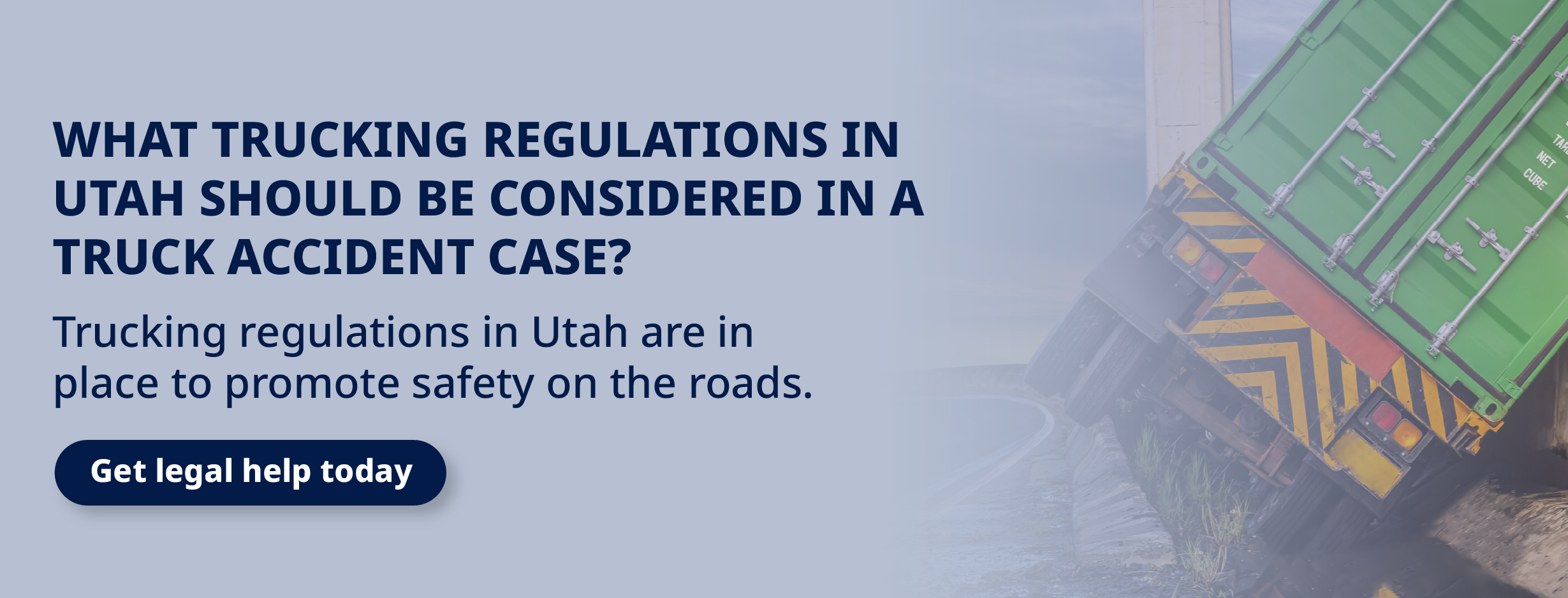¡Hablamos Español!
Commercial trucking is heavily regulated to ensure road safety and prevent catastrophic accidents. However, not all trucking companies or drivers adhere to these laws. When violations occur, the consequences can be devastating for other motorists, leading to serious injuries, property damage, and even fatalities.
In Utah, trucking operations are governed by both federal and state regulations, covering everything from driver qualifications and hours of service to vehicle maintenance and cargo loading. These laws are designed to reduce the risk of preventable accidents, but when companies or drivers cut corners, skip inspections, or ignore safety protocols, innocent people suffer the consequences.
At Flickinger Boulton Robson Weeks, our experienced Sandy truck accident lawyers have practiced personal injury law for over three decades. We understand how trucking regulations in Utah impact accident claims and use violations to hold negligent trucking companies accountable.
If you’ve been injured in a truck accident in Sandy, we can investigate whether federal or Utah trucking laws were violated and fight for the compensation you deserve. Contact us today to learn how we can be of assistance and fight for your rights.
The Federal Motor Carrier Safety Administration sets strict safety regulations for commercial trucking operations in the United States. These rules are designed to reduce the risk of truck accidents, improve road safety, and ensure that trucking companies and drivers follow best practices.
The Federal Motor Carrier Safety Regulations govern critical aspects of the trucking industry, including driver qualifications, hours of service, vehicle maintenance, and cargo securement. Violations of these regulations can increase the likelihood of accidents and may serve as evidence of negligence in truck accident claims.
Commercial truck drivers must meet specific qualifications before operating a large truck. The FMCSA requires all drivers to:
If a trucking company hires an unqualified driver or fails to conduct proper background checks, it can be held liable for negligence in an accident claim.
One of the leading causes of truck accidents is driver fatigue, which is why the FMCSA enforces strict Hours of Service regulations to prevent drowsy driving. Under these rules:
To ensure compliance, drivers are required to log their hours electronically using Electronic Logging Devices. If a trucking company pressures drivers to violate HOS limits or falsify records, it could be held legally responsible for accidents caused by fatigued driving.
Trucking companies are legally required to keep their vehicles in safe working condition through regular inspections, repairs, and maintenance. FMCSA regulations require:
Failure to maintain a truck properly can lead to brake failures, tire blowouts, or steering malfunctions, which significantly increase the risk of accidents.
Improperly loaded or unsecured cargo can cause rollovers, jackknife accidents, and cargo spills. FMCSA cargo securement regulations require:
If an accident is caused by cargo falling onto the road or shifting within the truck, the loading company or truck driver may be held liable.
The Federal Motor Carrier Safety Regulations are essential for ensuring truck safety and preventing accidents. However, violations of these rules can occur, as trucking companies often cut corners to save time and money. If you were injured in a truck accident in Sandy, a thorough investigation may reveal regulatory violations that contributed to the crash.
At Flickinger Boulton Robson Weeks, we hold negligent truck drivers and companies accountable and fight for the compensation our clients deserve. Contact us today for a free consultation.

In addition to federal trucking regulations, Utah enforces state-specific laws to ensure the safety of commercial truck operations within the state. These regulations govern areas such as hours of service, weight limits, licensing requirements, and vehicle inspections, complementing Federal Motor Carrier Safety Administration rules.
When trucking companies and drivers fail to comply with these laws, they increase the risk of serious accidents, potentially making them liable for damages in a truck accident claim.
While Utah follows the federal HOS rules for truck drivers operating interstate, there are slightly different requirements for intrastate trucking operations (those conducted entirely within Utah). Under Utah law:
These rules are meant to prevent driver fatigue, a major cause of truck accidents, but some trucking companies pressure drivers to exceed these limits, leading to dangerous conditions.
To legally operate a commercial truck in Utah, drivers must obtain a Utah Commercial Driver’s License. Utah’s CDL requirements include:
Failure to meet state CDL requirements or driving without a valid CDL can make a truck driver and their employer liable if an accident occurs.
Utah enforces state-specific weight and size limits for trucks traveling on its highways and roads. These include:
Overloaded trucks are harder to control, brake, and maneuver, significantly increasing the risk of rollovers and mechanical failures.
Commercial trucks operating in Utah must undergo regular safety inspections to ensure they meet state and federal safety standards. The Utah Department of Transportation conducts random roadside inspections and requires:
Utah’s trucking laws are designed to enhance road safety and reduce truck accidents, but violations are common among trucking companies trying to cut costs and increase profits.
If you’ve been injured in a truck accident in Sandy, an experienced attorney at Flickinger Boulton Robson Weeks can investigate whether a trucking regulation violation contributed to your crash. Contact us today for a free consultation.
Utah’s trucking regulations exist to prevent accidents, ensure road safety, and hold commercial drivers and trucking companies accountable. However, when drivers, trucking companies, or cargo handlers violate these laws, the risk of serious or fatal accidents increases significantly.
Many truck accidents in Sandy occur due to neglecting safety protocols, cutting corners, or failing to comply with federal and Utah trucking regulations. These violations not only endanger the truck driver but also put passenger vehicles, motorcyclists, and pedestrians at risk.
One of the most common and dangerous violations involves truck drivers exceeding the legally mandated driving limits. Federal and Utah laws restrict how long truckers can be on the road before taking required breaks.
When drivers exceed these limits, they suffer from fatigue, slower reaction times, and impaired judgment, which can lead to:
Many trucking companies pressure drivers to meet unrealistic deadlines, leading to violations of Hours of Service and other trucking regulations in Utah and increasing the risk of fatigue-related crashes.
Trucking companies and cargo handlers are required to secure and distribute cargo properly to prevent shifting or falling loads. When they fail to comply with weight limits and cargo securement rules, trucks become unstable, leading to:
Overloaded trucks also put excessive strain on brakes and tires, increasing the likelihood of mechanical failures and making it harder to stop in an emergency.
Trucking companies must routinely inspect, repair, and maintain their vehicles to ensure they are safe for road use. Neglecting proper brake checks, tire replacements, or engine maintenance can result in:
Mechanical failures due to poor maintenance or ignored inspections are entirely preventable, yet they remain a leading cause of serious truck accidents.
Violations of federal and Utah trucking laws are a major factor in many truck accidents. When trucking companies and drivers prioritize profits over safety, they put everyone on the road at risk.
If you have been injured in a truck accident caused by a regulatory violation, Flickinger Boulton Robson Weeks can help investigate the crash and hold the responsible parties accountable. Contact us today for a free consultation.

At Flickinger Boulton Robson Weeks, we understand that the violation of Utah’s trucking regulations often play a key role in serious truck accidents. When trucking companies or drivers fail to follow federal and Utah trucking laws, they put everyone on the road at risk.
Our firm conducts thorough investigations to uncover violations of safety regulations, hold negligent parties accountable, and maximize compensation for truck accident victims in Sandy.
One of the first steps in our investigation is reviewing the truck driver’s records to determine if they violated Hours of Service regulations. Drivers are required to log their driving hours using Electronic Logging Devices, which provide data on:
If a driver exceeded legal driving limits, it may indicate fatigue contributed to the accident, making the driver or trucking company liable for the crash.
Trucking companies must routinely inspect and maintain their vehicles to ensure they are operating properly and safely. Our firm gathers inspection reports, repair records, and maintenance logs to determine if mechanical failures played a role in the crash. We investigate:
If poor maintenance or ignored repairs caused the accident, the trucking company or maintenance provider may be held responsible.
Improperly loaded or overweight trucks are more prone to rollovers, jackknife accidents, and cargo spills. Our legal team:
If cargo loaders, trucking companies, or drivers failed to comply with these rules, they may be liable for the crash.
Commercial trucks are equipped with black box data recorders, which provide crucial evidence in accident investigations. Our firm works with accident reconstruction experts to analyze:
Our Utah personal injury firm leaves no stone unturned when investigating trucking regulation violations. If you’ve been injured in a truck accident in Sandy, our team is prepared to uncover critical evidence and fight for the compensation you deserve. Contact us today for a free consultation.
At Flickinger Boulton Robson Weeks, we are dedicated to helping truck accident victims in Sandy navigate the complexities of their claims and fight for the justice they deserve. Truck accidents often involve serious injuries, extensive financial burdens, and legal challenges, but you don’t have to face them alone.
Our experienced Sandy truck accident lawyers are here to investigate regulatory violations, hold negligent parties accountable, and secure the maximum compensation available for your case. Contact us today at (801) 500-4000 for a free consultation. Let us fight for the compensation and justice you deserve.
Bicycle Accidents
Motorcycle Accidents
Boating Accidents
Recreational Vehicle Accidents
Bus and Mass Transit Accidents
Pedestrian Accidents
Automobile Accidents
ATV or UTV Rollovers
Commercial Vehicle Accidents
Semi Truck and Trailer Accidents